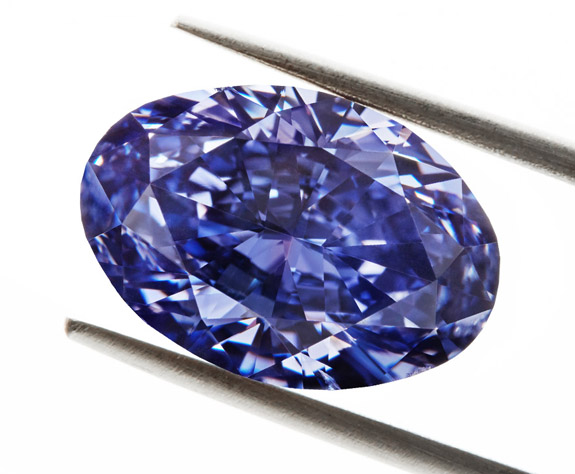May 4th, 2016
Described as "impossibly rare" and "a complete fluke of nature," the largest violet diamond ever found at Australia's Argyle mine could sell for $5 million or more.

The 2.83-carat polished oval-shaped diamond, known as The Argyle Violet, will headline the 2016 Argyle Pink Diamonds Tender, the annual showcase of the rarest diamonds from the Argyle mine in Western Australia.
The Rio Tinto-owned mine generates more than 90% of the world's pink diamonds, and on rare occasion will yield a violet stone. In the past 32 years, Argyle has produced only 12 carats of polished violet diamonds for its annual tender. In fact, before the discovery of The Argyle Violet, the mine had delivered just one other 1-carat-plus violet-colored diamond — and that was in 2008.

The Argyle Violet is "a complete fluke of nature," Josephine Archer from Argyle Pink Diamonds told Yahoo7 News.
Rio Tinto’s general manager of sales Patrick Coppens added, “Impossibly rare and limited by nature, The Argyle Violet will be highly sought after for its beauty, size and provenance.”

Argyle’s master polisher Richard How Kim Kam worked for more than 80 hours cutting the 9.17-carat oddly-shaped rough diamond into its perfectly symmetrical final form. More than 69% of the diamond's weight was lost during the cutting process.
The Argyle Violet was assessed a color grade of "Fancy Deep Greyish Bluish Violet" by the Gemological Institute of America. Violet diamonds owe their unique color to the presence of hydrogen atoms in the chemical composition of the stone.
Experts believe The Argyle Violet is sure to attract offers of $1 million to $2 million per carat at Argyle's annual tender. That would put its selling price somewhere between $2.8 million and $5.6 million.
Argyle Pink Diamonds manager Josephine Johnson said, “We are very excited to announce this historic diamond ahead of our Tender launch. This stunning violet diamond will capture the imagination of the world’s leading collectors and connoisseurs.”
Credits: Images courtesy of Rio Tinto.

The 2.83-carat polished oval-shaped diamond, known as The Argyle Violet, will headline the 2016 Argyle Pink Diamonds Tender, the annual showcase of the rarest diamonds from the Argyle mine in Western Australia.
The Rio Tinto-owned mine generates more than 90% of the world's pink diamonds, and on rare occasion will yield a violet stone. In the past 32 years, Argyle has produced only 12 carats of polished violet diamonds for its annual tender. In fact, before the discovery of The Argyle Violet, the mine had delivered just one other 1-carat-plus violet-colored diamond — and that was in 2008.

The Argyle Violet is "a complete fluke of nature," Josephine Archer from Argyle Pink Diamonds told Yahoo7 News.
Rio Tinto’s general manager of sales Patrick Coppens added, “Impossibly rare and limited by nature, The Argyle Violet will be highly sought after for its beauty, size and provenance.”

Argyle’s master polisher Richard How Kim Kam worked for more than 80 hours cutting the 9.17-carat oddly-shaped rough diamond into its perfectly symmetrical final form. More than 69% of the diamond's weight was lost during the cutting process.
The Argyle Violet was assessed a color grade of "Fancy Deep Greyish Bluish Violet" by the Gemological Institute of America. Violet diamonds owe their unique color to the presence of hydrogen atoms in the chemical composition of the stone.
Experts believe The Argyle Violet is sure to attract offers of $1 million to $2 million per carat at Argyle's annual tender. That would put its selling price somewhere between $2.8 million and $5.6 million.
Argyle Pink Diamonds manager Josephine Johnson said, “We are very excited to announce this historic diamond ahead of our Tender launch. This stunning violet diamond will capture the imagination of the world’s leading collectors and connoisseurs.”
Credits: Images courtesy of Rio Tinto.

